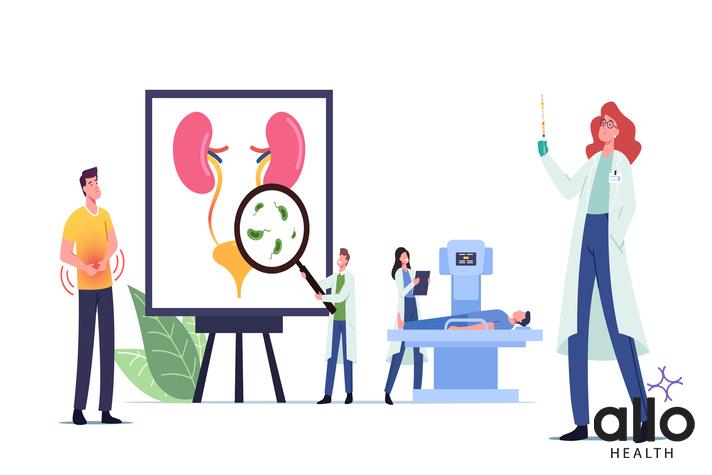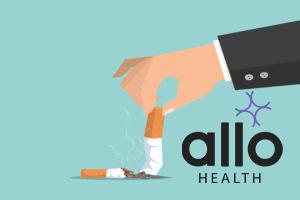Does Urinary Tract Infection Cause Erectile Dysfunction?

Allo Health is dedicated to personalized well-being, offering support and trusted information tailored to individual health goals. The platform emphasizes human-generated content, led by a distinguished medical team of experts, including physicians and sexual health specialists. Their commitment to credibility involves rigorous fact-checking, authoritative research, and continuous updates to ensure accurate, up-to-date information. Allo Health's unique approach goes beyond conventional platforms, providing expert-led insights and a continuous commitment to excellence, with user feedback playing a crucial role in shaping the platform's authoritative voice.

Ms Ashima Sahore has a masters in Clinical Psychology and has been working avidly in the space of therapy and research for the past 2 years. Her expertise lies in areas of stress, depression, anxiety, improving self-esteem, confidence, body appreciation among many others. She imbibes a wholesome approach to therapy and provides a non-judgemental, LGBTQAI+, and safe space.
Why This Was Upated?
Our experts continually monitor the health and wellness space, and we update our articles when new information became available.
Updated on 09 November, 2023
- Article was updated as part of our commitment to diversity, equity, and inclusion.

"The following blog article provides general information and insights on various topics. However, it is important to note that the information presented is not intended as professional advice in any specific field or area. The content of this blog is for general educational and informational purposes only.
Book consultation
The content should not be interpreted as endorsement, recommendation, or guarantee of any product, service, or information mentioned. Readers are solely responsible for the decisions and actions they take based on the information provided in this blog. It is essential to exercise individual judgment, critical thinking, and personal responsibility when applying or implementing any information or suggestions discussed in the blog."
You might know that your urinary system aids the body’s ability to absorb nutrients and eliminate waste, but do you know it is susceptible to infection? A urinary tract infection (UTI) is a localized infection that affects only your urine system. Tiny microorganisms enter the bladder through the urethra and cause an infection in the lower urinary system. UTIs can extend to your upper urinary tract and result in various sexual health issues while being easily curable.
UTIs are the second most common type of infection in the body, so most of us are familiar with how they feel, but many people don’t understand how they can cause several problems.
In this article, we will see if there is any linkage between urinary tract infection and erectile dysfunction.
What Is Urinary Tract Infection (UTI)
What happens when you urinate?
When you urinate, your bladder muscles contracts, forcing urine through the urethra and out of your body. The muscles in the urinary tract relax, allowing urine to flow while the bladder empties.
Urinary tract infections (UTIs) can affect both men and women, although they are more commonly associated with women. However, UTIs in men can occur and may present unique symptoms and causes. In this article, we will delve into the causes, symptoms, and risk factors associated with UTIs in men. Additionally, we will explore the relationship between UTIs and certain medical conditions like diabetes and spinal cord injuries.
Causes of UTIs in Men:
- Prostate Enlargement: As men age, the prostate gland can enlarge, leading to difficulties in fully emptying the bladder. This incomplete voiding can increase the risk of UTIs by allowing bacteria to accumulate in the urinary tract.
- Sexual Activity: Engaging in sexual activity can introduce bacteria into the urinary tract, increasing the likelihood of developing a UTI. Proper hygiene before and after sexual intercourse is crucial in reducing this risk.
- Blockages in the Urinary Tract: Structural abnormalities or blockages in the urinary tract, such as kidney stones or strictures, can impede the flow of urine and create an environment where bacteria can thrive, leading to UTIs.
- Catheter Use: Men who require long-term urinary catheterization, such as those with urinary retention or certain medical conditions, have an increased risk of developing UTIs. Catheters can introduce bacteria into the bladder if not handled and maintained properly.
- Weak Immune System: A compromised immune system can make it more challenging for the body to fight off infections, including UTIs. Men with weakened immune systems, such as those with HIV/AIDS or undergoing immunosuppressive therapy, may be more susceptible to UTIs.
UTI Symptoms in Men:

While UTI symptoms can vary, some common signs in men include:
- Frequent and Painful Urination: A persistent urge to urinate, accompanied by pain or a burning sensation, is a typical symptom of a UTI.
- Cloudy or Strong-Smelling Urine: UTIs can cause changes in urine appearance and odor. Cloudy or foul-smelling urine may indicate an infection.
- Lower Abdominal Pain or Discomfort: Men with UTIs may experience pain or discomfort in the lower abdominal region, including the area above the pubic bone.
Association with Medical Conditions:
UTIs can also be influenced by certain medical conditions, including:
- Diabetes: Individuals with diabetes may have elevated blood sugar levels, which can promote bacterial growth and increase the risk of UTIs. Proper management of blood sugar through medication, diet, and lifestyle modifications is important in preventing UTIs.
- Spinal Cord Injuries: Spinal cord injuries can disrupt normal bladder function, leading to urinary retention and incomplete emptying of the bladder. These factors can contribute to an increased risk of UTIs.
UTI, Urinary Retention, and Erectile Dysfunction
In some cases, a UTI can lead to urinary retention if there is bladder infection and interferes with its normal functioning. This can cause the bladder to become overly full, making it difficult to empty it completely. This can increase the risk of UTIs by allowing bacteria to accumulate in the bladder, which can lead to infection.
Urinary retention and erectile dysfunction (ED) can be related, as both conditions can be associated with nerve damage, spinal cord injuries, and certain medications. Nerve damage in the pelvic region can interfere with normal bladder and sexual function, leading to both urinary retention and ED. Additionally, certain medications used to treat urinary retention, such as alpha-blockers, can also contribute to ED.
Read on how urinary tract infection is linked to sex here.
What is Erectile Dysfunction?
Erectile dysfunction refers to having difficulty in achieving or maintaining an erection firm/hard enough for sexual intercourse all or most of the time. It is a very common sexual dysfunction in men, often causing embarrassment and anxiety for those experiencing it.
Experiencing some concerns with erections from time to time is normal and is no cause for worry or medical attention
The symptoms of erectile dysfunction (ED) can include:
- Difficulty getting an erection
- Difficulty maintaining an erection
- Reduced sexual desire
- Troubles with sexual function or performance
- Anxiety or depression related to ED
- Reduced or absent spontaneous erections
- Low self-esteem or insecurity related to sexual performance
Potential Causes Of Erectile Dysfunction

There are many possible causes for erectile dysfunction (ED), which can be physical, psychological, or a combination of both. Some common causes include:
- Cardiovascular diseases:Atherosclerosis, heart disease, high blood pressure, and other conditions that restrict blood flow to the penis can make it difficult to achieve and maintain an erection.
- Neurological conditions:Conditions such as multiple sclerosis, Parkinson’s disease, and spinal cord injuries can affect the nerves that control erections.
- Hormonal imbalances:Low testosterone levels, the primary male sex hormone, can contribute to ED.
- Medications:Effects of medication, such as antidepressants, antihistamines, and blood pressure medications, can cause ED as a side effect.
- Psychological factors:Anxiety, depression, chronic stress, and relationship concerns can all contribute to ED.
- Lifestyle factors:Smoking, consumption of illegal drugs, excessive alcohol intake, lack of sleep. High blood pressure,
To look for health problems that cause ED, your health care provider may order blood tests and collect a urine sample. The health expert will help direct you towards medical treatments for you.
UTI and Erectile Dysfunction
Although urinary tract infection and erectile dysfunction are not directly related, numerous physical health conditions that might lead to or worsen ED may also affect how often you urinate.
As men age, erectile dysfunction (ED) and lower urinary tract symptoms (LUTS) become more common.
Frequent urination does not, by itself, result in ED or other problems with sexual performance. However, some medical disorders may make you frequently urinate that are also linked to a higher risk of erectile dysfunction.
For instance, uncontrolled diabetes, enlarged prostate, issues with the spine, and radiation therapy are all possible reasons for frequent urination. Many of these are also erectile dysfunction risk factors.
Healthy nerve and blood flow are essential for erections. The nerves in your penis cause the production of organic compounds that widen your blood vessels and let blood flow into your penile tissue, increasing its size and firmness when you’re stimulated.
Erectile dysfunction and frequent urination may be caused by certain disorders that impair blood flow and nerve activity. However, there is no causative link between the two conditions; therefore, frequent urination cannot lead to Erectile dysfunction and vice versa, but microbial growth due to urinary tract infections can cause erectile dysfunction.
Treatment For UTI And Erectile Dysfunction
The treatment for urinary tract infections (UTIs) and erectile dysfunction (ED) depends on the underlying cause of each condition.
- UTIs are typically treated with antibiotics, which can be prescribed by a healthcare provider after a proper evaluation.
- It is important to take the full course of antibiotics as directed, even if your symptoms improve before the medication is finished, to ensure that the infection is fully treated.
- ED can be treated with medication, such as phosphodiesterase type 5 inhibitors (PDE5 inhibitors), which can improve blood flow to the penis and help achieve and maintain an erection.
- Other treatment options include vacuum erection devices, penile injections, and penile implants. In some cases, lifestyle changes, such as losing weight, exercising regularly, and quitting smoking, can also help improve ED.
Key Takeaways
- Urinary tract infections (UTIs) are localized infections that affect the urinary system and are caused by microorganisms entering the bladder through the urethra.
- UTIs can occur in both men and women, although they are more commonly associated with women.
- Causes of UTIs in men include prostate enlargement, sexual activity, blockages in the urinary tract, catheter use, and a weakened immune system.
- Symptoms of UTIs in men can include frequent and painful urination, cloudy or strong-smelling urine, and lower abdominal pain or discomfort.
- UTIs can be influenced by medical conditions such as diabetes and spinal cord injuries.
- While there is no direct causal link between UTIs and erectile dysfunction (ED), both conditions can be associated with underlying health issues such as nerve damage, spinal cord injuries, and certain medications.
- Treatment for UTIs involves antibiotics, while treatment for ED may include medication, lifestyle changes, and other interventions depending on the underlying cause.
Frequently Asked Questions
Q. Can UTIs cause erectile dysfunction (ED)?
A. While UTIs themselves do not directly cause ED, the discomfort and pain associated with a UTI can potentially affect sexual desire and performance.
Q. What are some treatment options for frequent UTIs?
A. Treatment options for frequent urinary tract infections (UTIs) typically involve low-dose antibiotics to kill the bacteria causing the infection and drinking plenty of fluids to help flush out the bacteria from the urinary system. Taking antibiotic after sex can also help. It is important to note that treating these infections as soon as possible is necessary so that they don’t lead to kidney infections.
Q. Are there any preventive measures to reduce the risk of both UTIs and ED?
A. Maintaining good hygiene, drinking plenty of water, practicing safe sex, and managing underlying health conditions (such as diabetes and hypertension) can help reduce the risk of both UTIs and ED. Consulting with a healthcare professional for personalized advice is recommended.







































